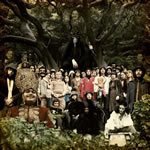
Devendra Banhart Cripple Crow
(XL)
It has been noted by other reviewers that the cover art of Devendra Banhart's album Cripple Crow is reminiscent of that for Sergeant Pepper and that this homage is intentional, signifying that, as with the Beatles' release, there is a change in musical style and work ethic. Where Banhart's earlier releases were largely solitary affairs, Cripple Crow sees the recruitment of a full backing band and was recorded with a host of visitors to the recording studio. The result is something that has been described as Banhart's first Rock album. Personally, I think the cover looks like a twisted version of Where's Wally (or Waldo for the American consumer), with beards and bindis instead of stripy jumpers and glasses. And really, this album is the logical (a word not commonly associated with Banhart) progression for a creative spirit at the height of its powers.
Hot on the heals of 2004's releases Nino Rojo and Rejoicing in the Hands, the figurehead of the new folk movement releases his third album for XL recordings. Although simple four track arrangements of yore may have been supplanted by lavish orchestration and vocal embellishment the end product could be that of no one else making music today.
While many of his peers seem to have to try so hard, weirdness comes effortlessly to Banhart. Beatles (ok perhaps there is something in the Sgt Pepper comparison), which reminds us that Paul McCartney and Ringo Starr are the only Beatles in the world, slips effortlessly into a musical sketch of dragonflies hallucinated while drunk on beer. But because Banhart's natural state of existence seems to be on a plane one removed from everyone else, the surrealism works. The songs are exercises in word play and imagery, from which every once in a cogent idea crystallises. Heard Somebody Say, a moving message of despair at ongoing war, nestles between a gentle salsa sung in Spanish and some lunacy about wanting his child to be a long-haired child.
At 22 tracks long, it is no mean feat that Cripple Crow is consistently brilliant. Moreover, at times Banhart doesn't just exceed but seems to transcend expectation, and the sheer joy that seems to emanate from the speakers on playing has an almost medicinal quality. For anyone brought low by the shortening of days and impending six months of drizzle, this might just help beat the seasonal affective disorder. This album is nothing short of a miracle, buy it, love it, and tell your friends.
29 November, 2005 - 00:00 — Peter Hayward